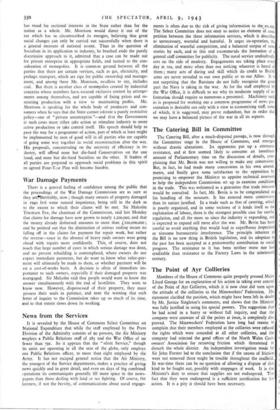The Catering Bill in Committee
The Catering Bill, after a much-disputed passage, is now through the Committee stage in the House of Commons, and emerges without drastic alterations. Its opponents put up a strenuous resistance, and at first seemed likely to consume an inordinate amount of Parliamentary time on the discussion of details, complaining that Mr. Bevin was not willing to make any concessions. But, in fact, he had made many concessions in his own amendments, and finally gave some satisfaction to the opposition by promising to empower the Minister to appoint technical assessors to help the independent Commission set up to examine conditions in the trade. This was welcomed as a guarantee that trade interests would be consulted. In fact, Mr. Bevin is to be congratulated on his handling of the measure. It has aroused more controversy than its nature justified. In a trade such as that of catering, which is poorly organised, and in some sections of it lends itself to the exploitation of labour, there is the strongest possible case for careful regulation, and all the more so since the industry is expanding, and is expected to expand still more after the war. Mr. Bevin has been careful to avoid anything that would lead to superfluous inspection or tiresome bureaucratic interference. The principle inherent in the Bill is no new thing in British legislation, and its adoption in the past has been accepted as a praiseworthy contribution to social progress. The resistance to it has been neither more nor less creditable than resistance to the Factory Laws in the nineteenth century.






















 Previous page
Previous page